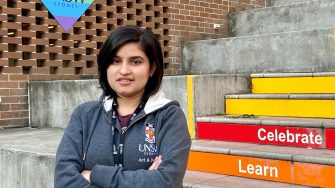
Humanitarian engineering research addresses chronic needs of poverty and lack of resources in line with the United Nations Sustainable Development Goals as well as acute needs associated with natural disasters and human displacement.
As UNSW Humanitarian Engineering (HE) academic coordinator Dr Andrew Dansie says, “Humanitarian Engineering is a part of every School in the UNSW Engineering Faculty, with real-world research being undertaken to develop appropriate and sustainable solutions to problems for disadvantaged communities.
“The UNSW HE competitive small grants program is designed to provide some extra support for PhD researchers whose research aim is to improve the lives and livelihoods of those in need in low or middle-income countries and Australia.”
In 2021 three UNSW Engineering PhD researchers were awarded Humanitarian Engineering grants of three thousand dollars to assist them with aspects of their vital studies.
Badal Pokharel was one of them:
Badal Pokharel, a third year PhD candidate at the School of Civil and Environmental Engineering, is researching in the area of disaster risk reduction and management (DRRM), specifically landslides triggered by earthquakes. Her PhD topic, supervised by A/Prof Samsung Lim is “Recognition, assessment and analysis of landslides in the central Nepal Himalayas.”
Badal comes from Kathmandu, and her research is motivated by the April 2015 disastrous earthquake in Nepal. Of magnitude 7.8 with its epicentre at Barpark, Gorkha, it was followed by thousands of aftershocks. About 9,000 people were killed and 14 districts in central Nepal were worst affected in terms of damage and loss of lives.
The main objective of Badal’s PhD research is to assess landslide inventories prepared in the aftermath of the earthquake, to develop site-specific landslide mapping units for the central Nepal Himalayas, and prepare landslide susceptibility maps.
The goal is to mainstream landslide susceptibility information to pre-landslide disaster planning and, ultimately, in providing products to reduce landside risk and enhance land use management policy in Nepal. This is closely aligned with the UN SDG 11 Sustainable Cities and Communities.
Badal uses machine learning algorithms and works in GIS and Linux environments to process data. A substantial part of her research focuses on delineation of slope unit maps, which are closely related with geology and topography, and hence suitable for landslide susceptibility zonation.
Obtaining large-scale data with sufficient details/resolution, however, is a challenging task in developing countries like Nepal, due to data scarcity and their cost.
Not surprisingly Badal used her UNSW Humanitarian Engineering grant to buy high resolution satellite images - that covered major sections of the Pasang Lhamu Highway, which connects Kathmandu, Nepal and Gyirong County.
These images are assisting her in current research projects with the Research Institute for Geo-Hydrological Protection of the Italian National Research Council (IRPI-CNR), Perugia, Italy. The aim is to introduce a method which uses existing morphometric data to generate rockfall susceptibility, very useful when direct field data of rockfall sources are not available during disastrous events like the Gorkha Earthquake.
Badal and her Italian co-supervisor Dr. Massimiliano Alvioli are also collaborating with the officials from Nepal who were directly involved in the relocation and reconstruction of vulnerable settlement post the Gorkha Earthquake and researchers in disaster communication.
The UNSW HE grant also helped Badal take part in two conferences (Geomorphometry 2021 and NatHazards 2021) to share her knowledge and research insights. “I believe it is very important” she says, “to reach out to the stakeholders, decision makers and practitioners involved in disaster risk reduction and management, and to share our research activities.”
“My PhD research at UNSW has been a good platform to give back and to contribute to the humanitarian sector via science.”
The Humanitarian Engineering small grants program releases a call for proposals annually in T1. For further information please see www.unsw.to/he or email Dr. Andrew Dansie (a.dansie@unsw.edu.au).
